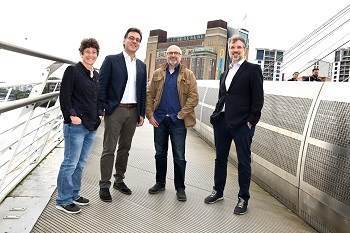North East mathematicians prepare to host prestigious research programme
13 September 2023
North East mathematicians prepare to host prestigious research programme
Experts in a newly emerging field of mathematics will meet in Newcastle upon Tyne next year after Northumbria University was awarded funding for a month-long programme of activities.
Academics from Northumbria, in partnership with Newcastle University, will host a prestigious Isaac Newton Institute Satellite Programme event in August 2024, focusing on the theme of ‘Emergent Phenomena in Nonlinear Dispersive Waves’.
The programme will be funded and supported by the Isaac Newton Institute (INI) of Mathematical Sciences in Cambridge – an international visitor research institute which runs research programmes on selected mathematical themes, attracting leading scientists from around the world.
The satellite programme scheme aims to highlight the work of researchers who are pushing the boundaries of their field – bringing together communities to collaborate, exchange ideas, and network, while at the same time shining a light on individual universities around the UK.
The announcement of the satellite event in Newcastle next year follows the prestigious six-month-long programme, organised by members of Northumbria University’s Mathematics of Complex and Nonlinear Phenomena (MCNP) research group, which took place at the Isaac Newton Institute in 2022.
It was the success of this event, and the resulting scientific discoveries and academic connections, which led to Northumbria being awarded funding for the satellite programme.
The satellite programme is led by Professor Gennady El and co-organised by Dr Antonio Moro and Dr Matteo Sommacal of Northumbria University’s Department of Mathematics, Physics and Electrical Engineering, Dr Magda Carr of Newcastle University’s School of Mathematics, Statistics and Physics, alongside with Professor Mark Hoefer, of the University of Colorado Boulder, USA and Professor Barbara Prinari, of the University at Buffalo, USA.
Speaking about the event, and its significance for the region, Professor El said: “The programme we ran at the INI last year was highly successful, with very positive feedback from all participants and some promising new discoveries and research collaborations happening as a result.
“To be given the opportunity to expand on what we achieved there, with this INI satellite programme next year, is very exciting and highlights the strength of the expertise we have here in the city of Newcastle.
“Between Northumbria and Newcastle universities we have probably the greatest concentration of research strength in this area in the UK and elsewhere, and we are looking forward to welcoming experts from across the globe to our city to share and build on that knowledge even further.”
Inclusivity will be a key aim for the month-long programme, with a focus on encouraging female mathematicians to take part and a special event dedicated to the research of women working in the field of dispersive hydrodynamics.
There will also be outreach activities taking place which will engage with the general public and young people, including a public lecture held at Newcastle’s historic Lit and Phil library, particularly aimed at GCSE and A Level Mathematics students.
Scientists from countries as far afield as France, Italy, Canada, USA, Brazil and Japan are expected to attend the programme.
The field of dispersive hydrodynamics is a mathematical framework which can be used to understand the mechanisms for emergent complex behaviours in non-linear waves as, for example, the formation and development of rogue waves and tsunamis in the ocean.
One of the discoveries to come out of the previous INI programme in Cambridge was linked to spectral theory of soliton gases in integrable dispersive hydrodynamic systems. This is a new interdisciplinary area in nonlinear science, initiated by Northumbria University’s mathematicians, focusing on the collective behaviour of large numbers of solitons – the localised nonlinear waves that persist in various media from water waves to optical fibres.
While the dynamics of individual solitons is well understood, their interactions in large groups can give rise to new phenomena that require a synergistic approach combining methodologies from a range of areas of mathematics and physics to be properly understood.
For instance, comprehension of soliton gases can help explain large and unpredictable wave fluctuations causing disruptions and structural damage in a variety of contexts, from offshore oil platforms to optical telecommunication systems.
Speaking about Northumbria’s previous programme at INI, Professor Ulrike Tillmann FRS NM, Rothschild & Sons Professor and INI Director, said: “It is clear that the programme was a huge success. I look forward to next summer's satellite programme at Northumbria.”
Find out more about the INI Satellite Programme – Emergent Phenomena in Nonlinear Dispersive Waves.

Pictured from left to right is Dr Magda Carr, of Newcastle University; and Dr Matteo Sommacal, Professor Gennady El, and Dr Antonio Moro, of Northumbria University.
